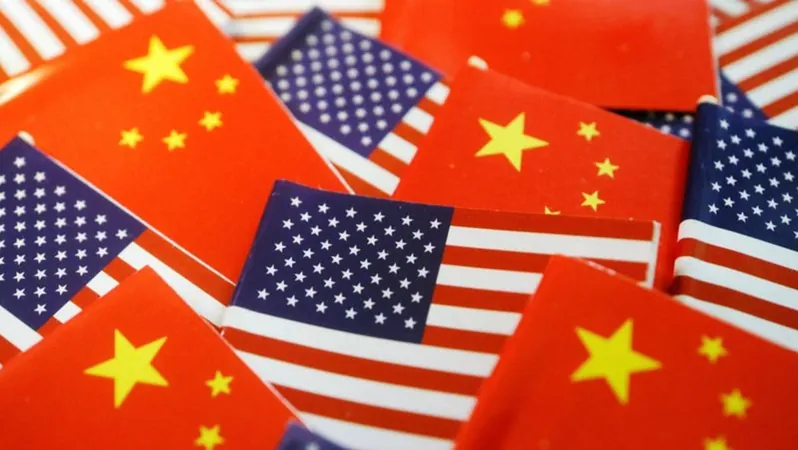
U.S. Set to Ban Chinese Tech in Connected Vehicles: What You Need to Know!
2024-09-21
Author: Wei
U.S. Set to Ban Chinese Tech in Connected Vehicles
In a major move reflecting escalating national security concerns, the U.S. Commerce Department is preparing to propose a ban on Chinese software and hardware in connected and autonomous vehicles. This announcement is expected to be made on Monday, September 23, as part of the Biden administration's intensifying crackdown on Chinese technology.
Sources indicate that the administration is particularly wary of how Chinese companies collect and manage data related to U.S. drivers and critical infrastructure, fearing that this information could lead to manipulations of vehicles that are increasingly dependent on internet connectivity and navigation systems.
This proposed regulation could significantly alter the automotive landscape in America by prohibiting the import and sale of vehicles from China that utilize key communication or automated driving technologies. This proposal builds upon recent actions by the federal government, which included sharp tariff increases on a variety of Chinese imports—most notably, electric vehicles (EVs), which now face a staggering 100% import duty.
Commerce Secretary Gina Raimondo has previously highlighted the potential dangers of integrating Chinese technology into the U.S. vehicle market. 'Imagine the chaos if a couple million cars suddenly became inoperable due to compromised software,' she warned.
In February, President Biden initiated an investigation into the security implications of importing Chinese vehicles, questioning whether these technologies pose substantial risks to U.S. security protocols. 'I will not allow China's policies to compromise our market and national interests,' he declared emphatically.
In a bid for transparency, the Commerce Department plans to open a 30-day comment period, allowing the public to voice their opinions before the rules are finalized. As nearly all modern vehicles on U.S. roads are considered 'connected,' they rely heavily on an array of onboard technologies that facilitate internet access, enabling them to share sensitive data with external networks.
The proposed software ban is set to take effect in the 2027 model year, while the hardware restrictions could kick in as early as January 2029. These bans would encompass vehicles equipped with Bluetooth, satellite, and other wireless features, as well as advanced autonomous vehicles capable of operating without a human driver.
Concerns have also been raised by a bipartisan coalition of lawmakers regarding the collection of sensitive data by Chinese tech firms while testing their autonomous vehicles within American borders. Interestingly, this regulatory action is not limited to China; it may also extend to other nations considered U.S. adversaries, including Russia.
Automakers, including major players like General Motors, Toyota, Volkswagen, and Hyundai, caution that implementing these restrictions would be a time-consuming process. They point out that the engineering and testing of automotive systems involve extensive pre-production validation, and switching out critical components is not a simple task.
While the precise number of Chinese-made light-duty vehicles currently entering the U.S. market is low, the implications of these regulations are significant. The White House has recently approved the final proposal aimed at safeguarding the supply chain for connected vehicles in America. Notably, this rule is designed to apply across the board, with exemptions only for agricultural and mining vehicles.
In this digitally connected age, where cars resemble smartphones on wheels, integrated with navigation systems and essential infrastructure, Biden's administration is determined to keep potential threats at bay. As the automotive industry eyes this evolving landscape, one question remains: how will these regulations reshape the future of driving in the U.S.? Stay tuned as developments unfold!

 Brasil (PT)
Brasil (PT)
 Canada (EN)
Canada (EN)
 Chile (ES)
Chile (ES)
 Česko (CS)
Česko (CS)
 대한민국 (KO)
대한민국 (KO)
 España (ES)
España (ES)
 France (FR)
France (FR)
 Hong Kong (EN)
Hong Kong (EN)
 Italia (IT)
Italia (IT)
 日本 (JA)
日本 (JA)
 Magyarország (HU)
Magyarország (HU)
 Norge (NO)
Norge (NO)
 Polska (PL)
Polska (PL)
 Schweiz (DE)
Schweiz (DE)
 Singapore (EN)
Singapore (EN)
 Sverige (SV)
Sverige (SV)
 Suomi (FI)
Suomi (FI)
 Türkiye (TR)
Türkiye (TR)
 الإمارات العربية المتحدة (AR)
الإمارات العربية المتحدة (AR)